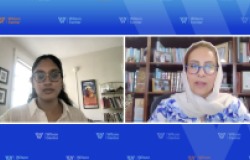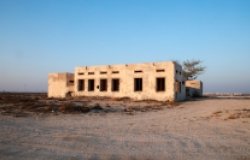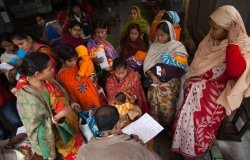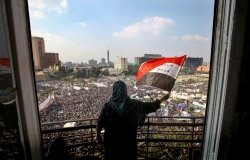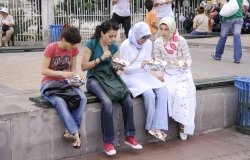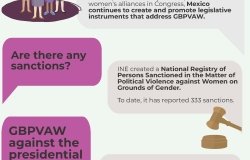MENA Women in the Reformist Process: A Retrospective
Experts will discuss women's role in the reformist process in the Middle East and North Africa region.
Overview
Several experts on women’s rights gathered to discuss women’s role in the reformist processes in the Middle East and to consider possible paths forward.
On October 18, the Middle East Program and the Global Women’s Leadership Initiative at the Woodrow Wilson Center hosted a two-panel discussion on “MENA Women in the Reformist Process: A Retrospective,” the first of which focused on women’s political participation and the second focusing on economic reforms and social change. Participants on the first panel included Farahnaz Ispahani, public policy scholar at the Wilson Center, former member of Pakistan’s parliament, and former Media Advisor to the president of Pakistan; Isobel Coleman, Senior Fellow and Director of the Civil Society, Markets, and Democracy Initiative, and Director of the Women and Foreign Policy Program, Council on Foreign Relations; Myriam Aucar, Committee on Women’s Affairs and the Committee of Foreign Relations at the Beirut Bar Association, Lebanon; and Sawsan Zaher, human rights lawyer at Adalah – The Legal Center for Arab Minority Rights in Israel, and Yale World Fellow, Yale University. Participants on the second panel were Moushira Khattab, former Public Policy Scholar, Woodrow Wilson Center, former Egyptian Ambassador to South Africa and to the Czech and Slovak Republics, and former Minister of Family and Population, Egypt; Kathleen Kuehnast, Director of the Center of Innovation for Gender and Peacebuilding, United States Institute of Peace; and Fatima Sbaity Kassem, former Director, UN-ESCWA Centre for Women. Rangita de Silva de Alwis, Director of the Global Women’s Leadership Initiative, moderated the first panel, and Caryle Murphy, former public policy scholar at the Wilson Center, moderated the second panel. Haleh Esfandiari, Director of the Middle East Program at the Wilson Center, provided introductory remarks.
De Silva de Alwis began the discussion by invoking the words of Hillary Clinton: “Women’s leadership is the unfinished business of the 21st century.” She continued to say that gender equality is the unfinished business of the revolutions that have taken place across the Middle East and North Africa (MENA) region. However, the current processes of redrafting and reforming constitutions across the region have provided an opportunity to ensure that women’s rights are enshrined in national legislation and that international human rights legislation, such as the Convention of the Elimination of all forms of Discrimination Against Women (CEDAW), has primacy over all national laws.
Ispahani provided an overview of women’s rights in the region over the last century, and pointed out that there have been many indigenous movements calling for democracy and gender equality that preceded the “Arab Awakening.” Ispahani outlined two areas that must be addressed to produce meaningful cultural and political change. Firstly, changing societal mindsets through curriculum reform in schools, and secondly, ensuring that there are gender-equitable laws on paper. Ispahani also spoke to the significance of women’s quotas in increasing and establishing women’s representation in politics.
Coleman noted that the Arab revolutions of recent years were not the first time that secular authoritarian regimes had been overthrown by Islamist-led political parties, whose conservative readings of Islam have already prompted a rollback in women’s rights. Coleman emphasized that periods of political transition are volatile times for women; however, there can be pushback on a conservative narrative through civil society action. She contrasted Tunisia and Egypt as case studies by looking at the position of women before each country’s revolution—Tunisian women had achieved an integration of rights beyond any other country in the region while Egyptian women lacked a quota and represented less than two percent of their parliament. Coleman cautioned that quotas are not a panacea for improving women’s status and rights.
Aucar spoke about legal reform and constitutional amendments in Lebanon. She discussed a number of discriminatory articles in the penal and civil codes, including those that deal with domestic violence, rape, and family law. Personal status laws in Lebanon, which differ according to individuals’ religious affiliation, also prevent a comprehensive law on issues such as marriage from being applicable to all citizens. Aucar called for the introduction of gender quotas, which may not be a solution but can act as a catalyst to increase women’s political participation.
Zaher discussed her work in training feminist lawyers and judges in Israel and the Palestinian territories on the “right to dignity.” She explained that the “right to dignity” is already integrated into the preamble of CEDAW, to which no country has made any reservations or restrictions. Further, “dignity” serves as an umbrella for rights to equality, autonomy, self-actualization, and respect. In the Palestinian context, in using regional legislation such as the Cairo Declaration on Human Rights in Islam (1990) and the Arab Charter on Human Rights (2004), equality between the sexes can be advocated for on the principle of dignity. The “right to dignity” approach can also be used in parallel to tackle the advancement of women’s rights in the process of official constitutional drafting.
Haleh Esfandiari started the second panel by introducing moderator Caryle Murphy and giving an anecdotal example to illustrate how the concept of women’s economic empowerment in Iran has evolved over the past four to five decades. In the past, empowering women economically may have meant a woman kept her earnings from doing small jobs in the form of the gold she owned; now, empowerment is occurring on a much larger scale where women are their own entrepreneurs and leading businesses.
Khattab transitioned the focus of the conversation from politics to economics, though she noted that the two were inseparable, and that to address them one must begin with education. She provided a series of statistics illustrating that according to most indicators of the Global Gender Gap index, women from the MENA region lag far behind women elsewhere in the world. She expressed skepticism toward the relatively high level of education attained by women in the region, noting that curricula can often be biased against women and minorities.
Sbaity-Kassem noted that everyone in the region, men and women, suffered from the greater economic troubles present. However, women have also suffered from gender biases, wage discrimination, and limited participation in the economy. Among 22 Arab countries, women officially made up an average of 29 percent of the workforce. Sbaity-Kassem cautioned that country statistics as reported by governments were skewed for political purposes and that the circumstances for women were worse than officially claimed. She then recommended that women empower themselves to force governments to recognize their rights, to implement gender-sensitive laws, and to institute gender quotas to give women a “seat at the table” to help promote equality.
Kuehnast concluded the discussion by quoting Woodrow Wilson: “You cannot, in human experience, rush into the light. You have to go through the twilight into the broadening day before the noon comes and the full sun is upon the landscape.” She stated that there was a need to manage expectations in the MENA region while still moving forward. Kuehnast noted that despite significant differences across age, level of education, ideology, and religious perspective among women in the region, women were able to reach consensus that personal security was a top priority. Kuehnast recommended that women establish a regional voice to discuss difficult issues, find common ground from which to coalesce, and to create an understanding and role for men in the reformist process.
By Samaa Ahmed and William Drumheller, Middle East Program
Speakers

Haleh Esfandiari
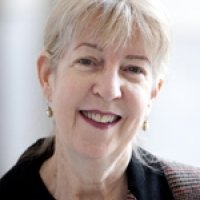
Caryle Murphy
Independent Journalist
Myriam Aucar
Isobel Coleman
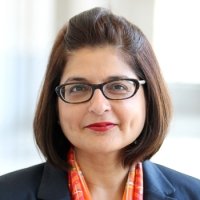
Farahnaz Ispahani
Senior Fellow, Religious Freedom Institute
Sawsan Zaher
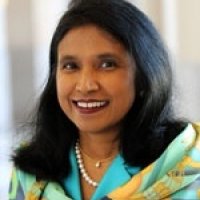
Rangita de Silva de Alwis
Visiting Fellow at Harvard Law School’s Human Rights Program
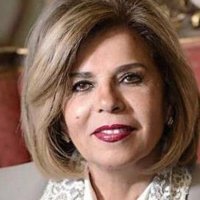
Moushira Khattab
First Vice Chair of the African Committee of Experts on the Rights and Welfare of the Child; Former Ambassador of Egypt to South Africa and to the Federal Republic of Czechoslovakia; and Former Egyptian Minister of Family and Population
Kathleen Kuehnast
Fatima Sbaity Kassem
Hosted By

Middle East Program
The Wilson Center’s Middle East Program serves as a crucial resource for the policymaking community and beyond, providing analyses and research that helps inform US foreign policymaking, stimulates public debate, and expands knowledge about issues in the wider Middle East and North Africa (MENA) region. Read more

Global Women's Leadership Initiative
The Global Women’s Leadership Initiative has hosted the Women in Public Service Project at the Wilson Center since June, 2012. The Women in Public Service Project will accelerate global progress towards women’s equal participation in policy and political leadership to create more dynamic and inclusive institutions that leverage the full potential of the world’s population to change the way global solutions are forged. Read more
Thank you for your interest in this event. Please send any feedback or questions to our Events staff.

